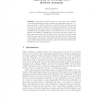Free Online Productivity Tools
i2Speak
i2Symbol
i2OCR
iTex2Img
iWeb2Print
iWeb2Shot
i2Type
iPdf2Split
iPdf2Merge
i2Bopomofo
i2Arabic
i2Style
i2Image
i2PDF
iLatex2Rtf
Sci2ools
100
click to vote
CSL
2007
Springer
2007
Springer
Tightening the Exchange Rates Between Automata
Automata on infinite objects were the key to the solution of several fundamental decision problems in mathematics and logic. Today, automata on infinite objects are used for formal specification and verification of reactive systems. The practical importance of automata in formal methods has motivated a re-examination of the blow up that translations among different types of automata involve. For most translations, the situation is satisfying, in the sense that even if there is a gap between the upper and the lower bound, it is small. For some highly practical cases, however, the gap between the upper and the lower bound is exponential or even larger. The article surveys several such frustrating cases, studies features that they share, and describes recent efforts (with partial success) to close the gaps.
| Added | 07 Jun 2010 |
| Updated | 07 Jun 2010 |
| Type | Conference |
| Year | 2007 |
| Where | CSL |
| Authors | Orna Kupferman |
Comments (0)

